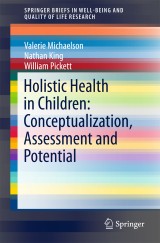Details

Holistic Health in Children: Conceptualization, Assessment and Potential
SpringerBriefs in Well-Being and Quality of Life Research
|
53,49 € |
|
| Verlag: | Springer |
| Format: | |
| Veröffentl.: | 21.08.2017 |
| ISBN/EAN: | 9783319648316 |
| Sprache: | englisch |
Dieses eBook enthält ein Wasserzeichen.
Beschreibungen
<div>This book presents the results of the Canadian Holistic Health in Children project. Rooted in an ancient concept, this study addresses some novel thinking surrounding the assessment of health and its determinants in adolescent populations. Holism refers to the assessment of complex systems as composite wholes, instead of or in addition to their constituent parts. This idea is rarely applied to the study of health in children, and its application to adolescent populations represents a potentially important gap in knowledge. It fills this gap by conducting a series of analyses in a mixed methods paradigm. Quantitatively, it develops new measures and analytic strategies to be used in the assessment of health and its determinants in adolescents, and then applied these a series of national and cross-national studies. Qualitatively, it explores the origins and models of health inferred from existing theory as well as quantitative findings with groups of young people, and captures the richness of their stories in recurrent themes and metaphor. </div><div><br/></div><div>This book outlines the basic elements of theory that underlie holistic understandings of adolescent health, quantitative and qualitative findings, and then presents and interprets the results and translates them into a series of practical recommendations.</div>
<div>Chapter 1: Introduction to Holism.- Chapter 2: Child Perceptions of Health.- Chapter 3: Metaphors and Child Health.- Chapter 4: Testing the Theory of Holism in Child Health Settings Using Quantitative Approaches.- Chapter 5: Integration of Findings.<br/></div>
Dr. Pickett is a PhD epidemiologist trained at Queen’s and the University of Toronto. He and his colleagues lead an active research program, with focus on the health of children, rural health, injury and violence prevention, and applied emergency medicine research. He is Deputy principal investigator of the Health Behaviour in School-aged Children Study in Canada. He is a lead investigator on the CIHR Team in Child and Youth Injury. He also is the principal investigator of several CIHR operating grants that involve study of adolescent health and its determinants, farm injuries, and injuries to children. <div><br/></div><div>Dr. Michaelson has primary research interests in “religion and childhood”, “child health and well-being” and “child spirituality”. Her primary training is in qualitative research methods, including phenomenology, grounded theory, arts based research and photo voice. She brings additional training and experience in knowledge translation and mixed methods approaches to data analysis and integration, and has worked as part of a mixed methods research team for the past 4 years. She also leads a Youth Engagement Program with the Childhealth 2.0 Research Team out of the Department of Public Health Sciences at Queen’s University. <br/></div>
<div><div>This book presents the results of the Canadian Holistic Health in Children project. Rooted in an ancient concept, this study addresses some novel thinking surrounding the assessment of health and its determinants in adolescent populations. Holism refers to the assessment of complex systems as composite wholes, instead of or in addition to their constituent parts. This idea is rarely applied to the study of health in children, and its application to adolescent populations represents a potentially important gap in knowledge. It fills this gap by conducting a series of analyses in a mixed methods paradigm. Quantitatively, it develops new measures and analytic strategies to be used in the assessment of health and its determinants in adolescents, and then applied these a series of national and cross-national studies. Qualitatively, it explores the origins and models of health inferred from existing theory as well as quantitative findings with groups of young people, and capturesthe richness of their stories in recurrent themes and metaphor. </div><div><br/></div><div>This book outlines the basic elements of theory that underlie holistic understandings of adolescent health, quantitative and qualitative findings, and then presents and interprets the results and translates them into a series of practical recommendations.</div></div>
Introduces the theory of holism and its application to adolescent health Outlines the basic elements of theory that underlie holistic understandings of adolescent health Provides practical recommendations on the factors that influence the health of adolescents Includes supplementary material: sn.pub/extras
<div>Introduces the theory of holism and its application to adolescent health</div><div><br/></div><div><div>Outlines the basic elements of theory that underlie holistic understandings of adolescent health<br/></div><div><br/><div>Provides practical recommendations on the factors that influence the health of adolescents</div><div><br/></div></div></div>
Diese Produkte könnten Sie auch interessieren:

Die Rolle der Lehrkraft im Wandel. Realisierung eines offenen, schülerzentrierten Unterrichts durch Arbeitspläne

von: Kristin Knierim

13,99 €

Einblick in den Schulalltag. Praktikumsbericht und Sequenzanalyse einer Deutschstunde

von: Mirko Krämer

18,99 €














